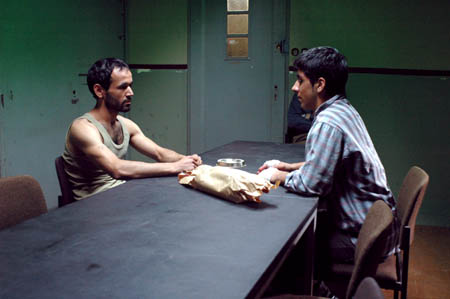|
Reviews of Recent Independent, Foreign, & Documentary Films in Theaters and DVD/Home Video
Directed & Written by: Yilmaz Arslan. Produced by: Eric Tavitian, Eddy Géradon-Luyckx, Donato Rotunno & Arslan. Director of Photography: Jean-François Hensgens. Edited by: Andre Bendocchi-Alves. Music by: Evgueni Galperine. Released by: Koch Lorber. Language: Kurdish, German & Turkish with English Subtitles. Country of Origin: Germany. 96 Minutes. Not Rated. With: Xewat Gectan, Erdal Celik, Nurettin Celik, Bulent Buyukasik, Xhiljona Ndoja, Taies Farzan & Oral Uyan. In Germany, two sets of brothers fatally clash with horrific consequences – the recently arrived Kurdish Semo and Azad versus Turks Ahmet and Zeki. By the film’s end and after a spiraling cycle of frenzied revenge, emigrating to Albania looks like a step up. While the mostly non-professional cast occasionally shines, the characters tend to be one-dimensional – the Bad Brother, Semo, played by Nurettin Celik, sends nefariously earned money back home to his Kurdish village for his younger Good Brother, Azad (Erdal Celik), to join him in Europe. At a dormitory shelter for refugee minors, Azad then mentors a small boy, the Adorable Orphan, Ibo (Xewat Gectan), to become a barber like himself. Azad practically adopts the Kurdish boy as a younger brother. Meanwhile, the Turks are pretty much thugs, whether those in their native land or the pit bull-loving brothers in Germany. The Turks and the Kurds intersect on a bus in a confrontation over the aggressive dog that escalates from ethnic slurs into stabbings and a lot more. Some of the relationships are only gradually, and a bit confusingly, revealed or they may be missed by those dependent on the English subtitles who can’t recognize the language differences. The macho behavior seems as stereotypical as the patronizing German policemen who dismiss the migrants as ungrateful for their government benefits or the Kurdish community rights activist who uses them to make political points. While the opening scenes in their native land emphasize how distant and poor the rural shepherds are from the modern Germany they will face, Ibo’s narration is heavy-handed in making the comparison, even as it continues throughout the film. While Azad has sweet interludes with an Albanian girl, they are overshadowed by the visceral violence and gruesome revenge. The vicious treatment of Russian prostitutes, as in many other films, is repeated here, but their plight is seen more as the merciless downtrodden mistreating the even more hopelessly downtrodden. (Lilja 4-ever provides more context.) Writer/director Yilmaz Arslan, a Kurd born in Turkey, has lived in Germany since he was seven. There are flashes in this, his third feature film, that he can create circumstances that are more complex for his characters. When Ibo attends school for the very first time, he lets his childish imagination relax into fantasy through a poignant animation sequence. In other intriguing scenes, Azad desperately attempts to reconcile old world traditions and the new by confronting the Turks’ angry parents with a formal apology for his brother’s battle with their son. But later when Azad furiously relates how their other son has taken his vengeance to a shocking level, the parents look at this son with fresh and disgusted eyes.
While the English subtitles translate the young people’s status as refugees or exiles, rather than as immigrants seeking
assimilation, their story is familiar from generations of movies. More recently, other films have dealt much more effectively with
many of these same issues around displaced young people in the new polyglot Europe: Head-On, for the complexities of Turks
adjusting to Germany; Schizo, about teenagers fending for themselves amidst changing economic realities; and
In This World’s child refugees from Afghanistan on their own.
Nora Lee Mandel
|

